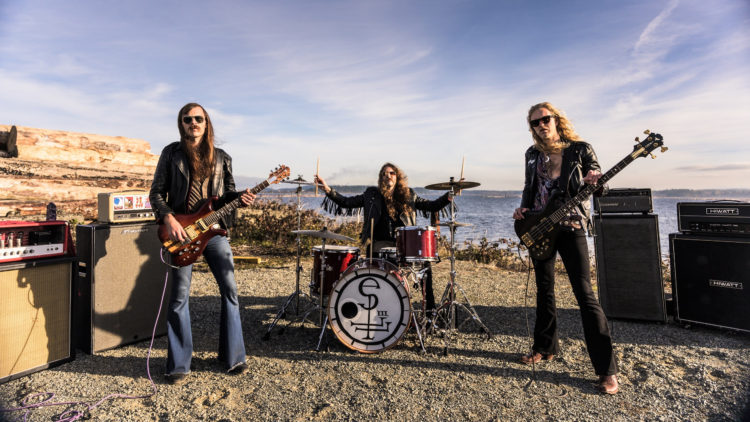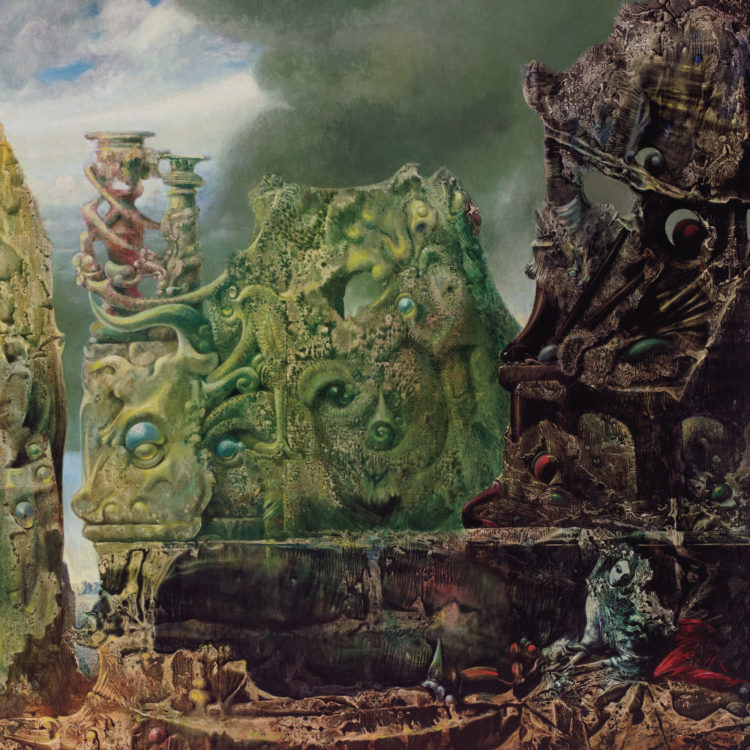
Hailing from the mountainous west coast of Canada, Spell is a hard rock/metal power trio that combines old school musical authenticity and recording processes, with a thoroughly modern lyrical sensibility that swings from songs of inspiration and personal empowerment, to the decline of modern society and the humans who inhabit it.
Opulent Decay is the third album from the Vancouver-based group, following on the heels of their 2014 debut Full Moon Sessions, and For None and All, which came out in 2017. The group is comprised of bassist/vocalist Cam Mesmer, drummer/vocalist Al Lester and guitarist Graham McVie, and have actually been playing together since 2007 when they were teenagers dreaming of heavy metal stardom.
“The drummer and myself are brothers, literal brothers from the same mother. We have been playing together well before this band. We knew Graham from the local rock scene. We had seen him at some shows and in some bands that he was playing in and vice versa. It came to a point where we wanted to start a more serious heavy rock band and he was the first guy we thought to call because we knew he could rip it up onstage,” said Mesmer.
Mesmer and Lester share many of the vocal duties, a necessity in a band with only three members. For Mesmer its never been a comfortable position, but the more he does it, the more confident he gets. What has helped him is that Spell’s songs are crafted in a manner to fit his voice rather than him having the stress and strain his pipes to try and shriek and howl like some metal singers do.
“I have done most of the singing up to this point. Al has done some lead singing and does a lot of background singing and harmonizing and I am hoping he does more because he is a great singer. To be totally honest, singing has never come easy to me. I am not one of those naturally heroic sorts of rock and metal singers. Its different than playing guitar. I feel that pretty much anyone can get good at guitar if you practice enough. To me, singing is different. I really tried to get as good as I could get over the years, but I will never be Rob Halford [Judas Priest]. My approach to singing is to focus more on sound and the song; choosing the right notes and trying to develop the perfect beautiful harmony and melody to go with it,” he said.
“I definitely grew up worshipping Bruce Dickinson of Iron Maiden and Halford and those guys, but lately I have been trying to model my own vocals after guys like Peter Gabriel, who doesn’t have that sort of powerhouse voice. He is always picking his notes carefully. Or there’s a guy like Andy Powell of Wishbone Ash, he is more of a subtle singer, but he’s always got beautiful vocal lines. I also have really come to admire great soul singers like Diana Ross and Nina Simone, because they write and sing such beautiful melodies.”
Mesmer has dubbed the bands sound as ‘hypnotizing heavy metal’ and it is a sound that is ever evolving as the band members mature in their personal tastes and grow more adventurous in their collective musical explorations.
“We have definitely evolved since our first album came out. We started more or less directly aping our idols. We were influenced by Iron Maiden, Judas Priest, Accept, Megadeth and stuff like that. And we still love those bands. But our music tastes have become a lot more diverse. We’ve been getting into jazz and Motown and we have always been into prog and soul music. We don’t ever hesitate to bring other types of influences into our music. There are some bands that decide in advance what type of genre or sub-genre they want their band to be in. We’ve never had that attitude. We always wanted to bring in whatever music we’re enjoying. We will bring it all into the fold and be inspired by it,” said Mesmer.
There is a rawness and grit that infuses every song on Opulent Decay which, coupled with the pounding riffs, exceptional musicianship and intelligent lyrics, make for a dynamic listening experience.
“We waited until all the songs were as good as they possibly could be before going into the studio. Once there, we really tried to recreate the epic sort of sessions of the 1970s and 1980s where we all went to the recording studio [Little Red Sound in New Westminster] and just lived and breathed the album for about two weeks straight. We were there all day and all night just tracking. And we did pretty much everything recording to tape. It’s pretty much all analog. So, everything you hear, all the bed tracks, are live. There is no serious tweaking, no Autotuning or all that bullshit. It’s all real playing,” said Mesmer.

“We played each song over and over until we got it as good and as tight and with as much energy as we could until we were done. There are some imperfections, but to me that’s part of the beauty of it.
From the outset, there was never any doubt or questioning the band’s power trio configuration, according to Mesmer.
“We’ve never added any more members or even considered adding any more members. It’s been the three of us now for almost 14 years. We’re not looking to change that any time soon. We do quite a bit to layer up the sound. Obviously in the studio we will sing harmony and add some synthesizers and overdubs. When we go live, we try our best to replicate that. We use a similar set up to what Rush used where we’ve got bass pedals and we can play some keyboard parts with our feet. We will also use our feet to trigger samples in real time, the same way Rush did,” he explained.
“Some bands have everything gridded up to a click track. I was at a sound check for a show we were the opening act at a little while ago and the main band was sound checking and they sounded pretty good. But then they stopped playing, but the song continued. I thought that was pretty ridiculous, that’s cheating. We don’t do anything like that. Whatever we trigger we have to hit it at the right time, and if we’re not playing perfectly in time with it, it’s going to sound terrible.”
Songwriting wise, the band is as collaborative and democratic as they can be, with egos subsumed in order to make the best music, the best song, possible for Spell.
“It’s pretty wide open in that we all respect each other’s ideas and we all bring stuff forward. On this new album, I brought most of the original song ideas forward. I wrote a lot of them on my own and recorded some little demos which I played for the other guys and then together we would all build the songs up from those foundations. Each person in the band brings their own unique way of making songs better, whether it’s changing the key or doing something different with the pre-chorus to make the chorus pop, or maybe playing a part in a different mode or doing something different with the chords. We all pay attention to the song and do what we can to make the song better,” Mesmer said.
“And it’s not always easy to do that. You really have to put aside your own ego and do what’s best for the band. If I have a song that I have been working on for a year and I bring it in and suddenly one of the other guys says, ‘hey, let’s play it backwards,’ sometimes it takes a while to stop hearing it the way I had originally been hearing it and hear it in a new way. But in almost every instance when that happens, even when it hurts, the songs get better.”
The title track effectively sets out the mandate and overall theme of the album, as it dissects the nature of our acquisitive, consumerist society and how it is leading people down a road to emotional emptiness and psychological ruin.
“It’s asking if you are spending your life just seeking out luxury and wealth for yourself, then what meaning do you really bring to yourself. It’s looking at the way in which you can maybe challenge yourself a little more and live a little bit of a harder life in order to actually be able to create something that might be more meaningful and more lasting. How can you create art and beauty if you have never experienced any suffering in your own life? If all you are thinking about is acquiring more and more ease and comfort for yourself, then how do you get the perspective you need to share something that is valuable with the rest of the world?” said Mesmer, who said the song Dawn Wanderer, follows a similar narrative thread.
“That song took me the longest. I think I was working on it right around the time we were recording our last album. But I couldn’t quite get it to come together properly, so I didn’t rush it. And I am glad I didn’t because when I finally got all the parts to work together, because I wanted it to really pop for me, it’s now become one of my favourite songs on the record. It’s about what you can do in your life to give something to someone else, to help other people around you, which also helps bring meaning to your own life. It’s kind of about looking back at what you’ve done at the end of your life and reflecting back, wondering whether you’ve just spent your days indulging yourself and hoarding wealth, or whether you spent your days bringing happiness to those around you and bringing meaning to the people you know, and coming to understand which one of those paths has more value in the long run.”
One of the singles/videos that Spell has released is for the powerhouse song Psychic Death, which is structured as a debate as to the value and importance of creating art for its own sake.
“It was one of the first songs that we worked on for this album. It originally came from a discussion we were having about the process of creating art and bringing something new into the world. Probably most songwriters face doubts as to whether or not even bother trying to add something new. We have so much great and beautiful art and music in the world already, why should I even bother truing to create something new that is going to inevitably be second rate compared to what is truly great and already exists. That’s one side of the argument,” Mesmer said.
“The lyrics are sort of set up as a counterargument to that. It’s sort of like having the devil on your shoulder trying to convince you that you shouldn’t bother trying to create new art or music. But the way I have written it, is I have tried to make that argument defeat itself by overreaching itself a little bit. So, in every argument against doing art, there is the counterargument subtly built in. The purpose of the song is to give you the courage to actually go out and try to create some music for yourself and for the world.”
For more information on Spell, Opulent Decay and any post-Covid-19 tour dates, visit the bands social media channels: www.facebook.com/spellspell or www.instagram.com/spellofficial.
- Jim Barber is a veteran award-winning journalist and author based in Napanee, ON, who has been writing about music and musicians for 30 years. Besides his journalistic endeavours, he now works as a communications and marketing specialist. Contact him at jimbarberwritingservices@gmail.com.
SHARE THIS POST:
